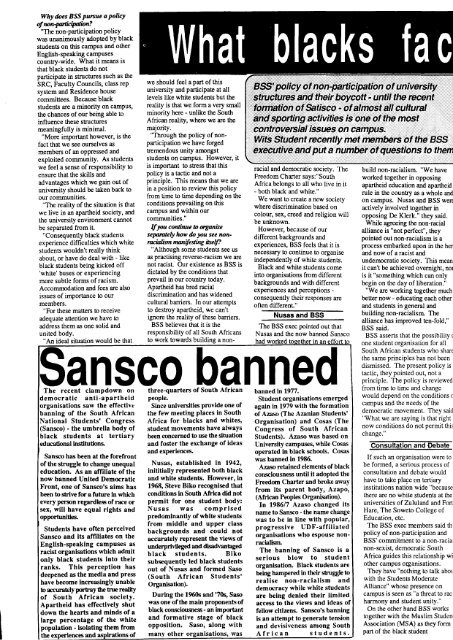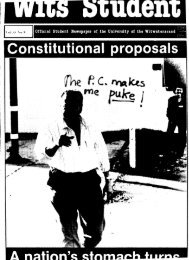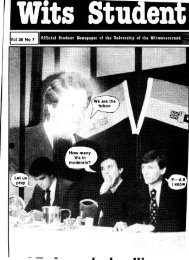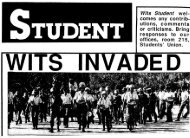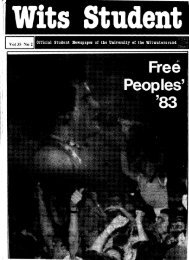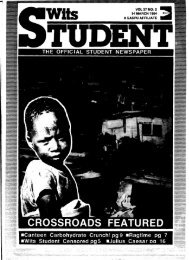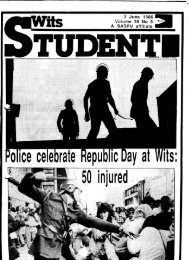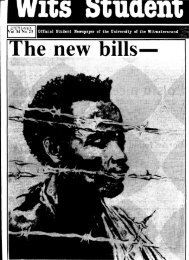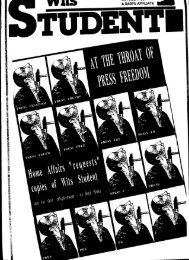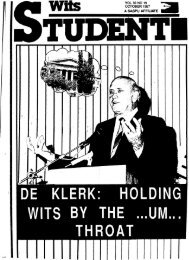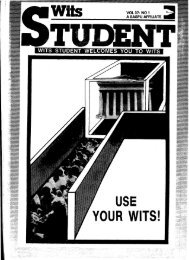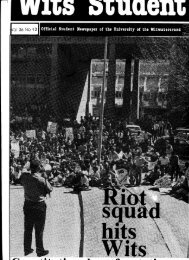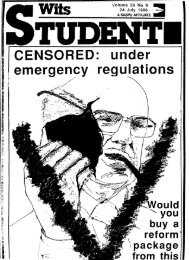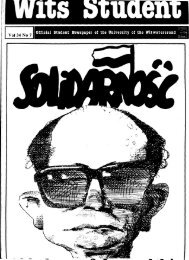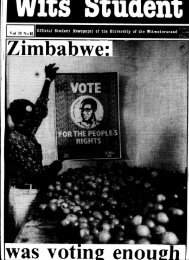Volume 40 Number 06 - Department of Computer Science
Volume 40 Number 06 - Department of Computer Science
Volume 40 Number 06 - Department of Computer Science
Create successful ePaper yourself
Turn your PDF publications into a flip-book with our unique Google optimized e-Paper software.
Why does BSS Pursue aPolicY<br />
<strong>of</strong>wn-pticipion?<br />
"The non-particiPation PolicY<br />
was unanimously adoPted bY black<br />
students on this camPus and other<br />
English-speaking canpuses<br />
country-wide. What it means is<br />
that black students do not<br />
participate in structures such as the<br />
SRC, Faculty Councils, class reP we should feel a part <strong>of</strong> this<br />
system and Residence house university and participate at all<br />
.t . . . ,<br />
committees. Because black levels like white students but the<br />
and their b<strong>of</strong>cott:- until the rccg'nt : : :<br />
studeDts are a minoritY on camPus, reality is that we form a very small<br />
the chances <strong>of</strong> our being able to minority here - bisatisco - dii almo$ all"eultural :,<br />
unlike the South<br />
,<br />
infl uence these structures African reality, where we are the<br />
ng activities is one <strong>of</strong> the mosf ,'<br />
,<br />
meaningfully is minimal.<br />
majority.<br />
ilalLisrrcs onbampUi:<br />
"More important however, is the "Through the policy <strong>of</strong> non-<br />
fact that we see ounelves as participation we have forged<br />
members <strong>of</strong> an oppressed and tremendous unity arnngst<br />
exploited community. As students students on campus. However, it<br />
we feel a sense <strong>of</strong> responsibility to is important to sftess that this<br />
ensure that the skills and<br />
policy is a tactic and not a<br />
advantages which we gain out <strong>of</strong> principle. This means that we are<br />
university should be taken back to in a position to review this policy<br />
our communities.<br />
from time to time depending on the<br />
"The reality <strong>of</strong> the situation is that conditions prevailing on this<br />
we live in an apartheid societY, and campus and within our<br />
the university enviroDment cannot communities."<br />
be separated from it.<br />
lf you contbue to otganLse<br />
" Consequently black students sepmtely how do 1nu see tun-<br />
experience difficulties which white rucinlism nmife sting i&elfr<br />
students wouldn't really think "Although some students see us<br />
about, or have do deal with - like as practising reverse-racism we are<br />
black students being kicked <strong>of</strong>f not racist. Our existence as BSS is<br />
'white'<br />
buses or experiencing dictated by the conditions that<br />
more subtle forms <strong>of</strong> racism. prevail in our country today.<br />
Accomrnodation and fees are also Apartheid has bred racial<br />
issues <strong>of</strong> impor[ance to our discrimination and has widened<br />
members.<br />
cultural barriers. In our attempts<br />
"For these matters to receive to desftoy apartheid, we can't<br />
adequat€ attention we have to ignore the reality <strong>of</strong> these barriers.<br />
address them as one solid and BSS believes that it is the<br />
united body.<br />
responsibility <strong>of</strong> all South Africans<br />
"An ideal situation would be that to work towards building a non-<br />
ocratic antl-apartheid people.<br />
nisations saw the effectlve Since universities provide one <strong>of</strong><br />
banning <strong>of</strong> the South Afrlcan the few meeting places in South<br />
National Students' Congress Africa for blacks qnd whites'<br />
Sansco) - the umbrella body <strong>of</strong> student movements have alwaYs<br />
black students at tertiary been cuncerned to use the situation<br />
lnstitutions<br />
and foster the exchange <strong>of</strong> ideas<br />
and experiences.<br />
Sansco has been at the forefront<br />
<strong>of</strong> the struggle to change unequal Nusas, establlshed ln 1942,<br />
educatlon. As an affiliate <strong>of</strong> the inttitially represented both black<br />
now banned United Democratic and white students. However, in<br />
Front, one <strong>of</strong> Sanscots aims has 1968, Steve Biko recognised that<br />
been to ffve fa a future ln wNch conditions in South Afrlca did not<br />
every person regardless <strong>of</strong> race or permit for one student body:<br />
sex, will have equal rlghts and Nusas was comprised<br />
opportunides<br />
predominantly <strong>of</strong> white students<br />
from middle and upper class<br />
Students have <strong>of</strong>ten Perc€ived backgrounds and could not<br />
Sansco and its afllliates on the accurately represent the vlews <strong>of</strong><br />
English-speaking campuses as underprivileged and disadvantaged<br />
racist organisations which admit black students. Biko<br />
only black students lnto their subsequently led black students<br />
ranks. Thls perception has out <strong>of</strong> Nusas and formed Saso<br />
deepened as the medla and Press (South African Students'<br />
have become increaslngly unable Organisation).<br />
b rturatelyportayfte tue realff<br />
<strong>of</strong> South Afrlcan soclety. During the 1960s and'70s, Saso<br />
Apartheid has effectlvely shut was one <strong>of</strong> the main proponents <strong>of</strong><br />
down the hearts and minds <strong>of</strong> a black consciousness - an important<br />
large percentage <strong>of</strong> the whlte and formative stage <strong>of</strong> black<br />
population - isolating them from opposition. Saso, along with<br />
: :irfixi'rii'At*::l::i,tii+ir,,'riii,,iiid jetil::::::::::::<br />
, ,, ,,' , .<br />
i:|tsf,,,f,rrPv.v'2,,Y'i,.vs1.'.,i,t{rts,i,,,l.,.,t,.,t,i:,.,.,t,.,t,.,.,.,t,.,.,,ii.,,,,<br />
e4|t|,ffiitly .. ..0f.ilre,.81<br />
end p uf e,in uffi<br />
:on:quest'oh3 1,,*<br />
racial and democratic society. The build non-racialisrn "We have<br />
Freedom Charter says: "South worked together in opposing<br />
Africa belongs to all who live in it apartheid education and apartheid<br />
- both black and whi!e."<br />
rule in the country as a whole and<br />
We want to creale a new society on campus. Nusas and BSS wen<br />
where discrimination based on actively involved together in<br />
colour, sex, creed and religion will opposing De Klerk." they said.<br />
be unknown.<br />
While agreeing the non-racial<br />
However, because <strong>of</strong> our<br />
alliance is "not perfect", they<br />
different backgrounds and<br />
pointed out non-racialism is a<br />
experiences, BSS feels that it is process embarked upon in the her<br />
necessary l,o continue to organise and now <strong>of</strong> a racist and<br />
independently <strong>of</strong> while students. undenncratic society. This mean<br />
Black and white students come it can't be achieved overnight, nor<br />
into organisations from different is it "something which can only<br />
backgrounds and with different begin on the day <strong>of</strong> liberation."<br />
experiences and perceptions -<br />
"We are working together much<br />
consequently their responses are better now - educating each other<br />
<strong>of</strong>ten different."<br />
and students in general and<br />
Nusas and BSS<br />
building non-racialisrn The<br />
alliance has improved ten-fold,"<br />
TheBSS<br />
exec pointed out that BSS said.<br />
Nusasand<br />
the now banned Sansco BSS asserts that the possibility r<br />
had<br />
one student organisation for all<br />
ansco banned<br />
South African students who shar<br />
the same principles has not been<br />
dismissed. The present policy is<br />
tactic, they poinled out, not a<br />
principle. The policy is reviewed<br />
rcent clamodown on three-quarters <strong>of</strong> South African hnnned in 1977.<br />
from time to time and change<br />
would depend on the conditions c<br />
Student organisations emerged<br />
campus and the needs <strong>of</strong> the<br />
again in 1979 with the formation<br />
democratic movement. They said<br />
<strong>of</strong> Azaso (The Azanian Students'<br />
"What we are saying is that right<br />
Organisation) and Cosas (The<br />
now conditions do not permit this<br />
Congress <strong>of</strong> South African<br />
change."<br />
Students). Azaso was based on<br />
University campuses, while Cosas ffi<br />
operated in black schools. Cosas<br />
was banned in 1986.<br />
If such an organisation were to<br />
Azaso retained elements <strong>of</strong> black be formed, a serious process <strong>of</strong><br />
consciousness until it adopted the consultation and debate would<br />
Freedom Charter and broke awaY have to take place on tertiary<br />
from its par€nt body, AzaPo' institutions nation wide "because<br />
(African Peoples Organisation). there are no white students at the<br />
In 198617 Azaso changed its universities <strong>of</strong>Zululand and Forl<br />
name to Sansco - th€ name change Hare, The Soweto College <strong>of</strong><br />
was to be in line with popular, Education, etc.<br />
progressive UDF-affiliated The BSS exec hembers said th<br />
organisations who espouse non- policy <strong>of</strong> non-participation and<br />
racialbrn<br />
BSS' commitment to a non-racra<br />
The banning <strong>of</strong> Sansco is a non-sexist. democratic South<br />
serious blow to student Africa guides this relationship wi<br />
organisation. Black students are other campus organisations.<br />
They have "nothing<br />
being hampered in their sfugle to<br />
to talk abor<br />
realise non-racialism and with the Students Moderate<br />
democracy while white students Alliance" whose presence on<br />
campus is seen as "a<br />
are being denled thelr limited<br />
threat to rac<br />
access to the views and ideas <strong>of</strong> harmony and student unity."<br />
fellow citlzens. Sansco's banning On the other hand BSS works<br />
is an attempt to generate tension together with the Muslim Studen<br />
and devisiveness among South Association (MSA) as they form<br />
oart <strong>of</strong> the black student<br />
the and manv other African students.


